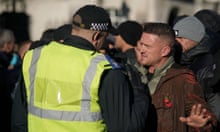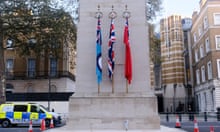Police have vowed to thwart the rise of the far right, which they have said is the fastest-growing terrorist threat in the UK, as they try to stop race hate ideologues from bringing violence to the country’s streets.
Britain’s top counter-terrorism officer, the Met assistant commissioner, Neil Basu, said the most likely attempts would come from “lone actors” and, as with Islamist terrorism, the authorities could not guarantee to foil every plot.
The Guardian understands that investigators have found links on far-right material on legitimate platforms such as YouTube that allow people to find more extremist propaganda.
Police said they and MI5, which since 2018 has taken the lead on the most serious extreme rightwing plots, were carrying out 80 investigations to stop violence fuelled by ideologies such as white supremacism and Islamophobia.
In their first public briefing since far-right terrorists murdered the Labour MP Jo Cox in 2016 and murdered a Muslim worshipper near a north London mosque in 2017, police revealed:
A quarter of all terrorism arrests in the past year were linked to far-right violence.
The far-right caseload of counter-terrorism police jumped from 6% to 10% in the last two years.
Referrals to Prevent, the anti-radicalisation programme, had almost doubled between 2016 and 2018 for the far right, from 10% to 18%, and were expected to rise further.
A third of all terror plots to kill in Britain since 2017 – seven out of 22 – were by those driven by extreme-right causes.
Basu said police were battling to stop extreme rightwing terrorism gaining more of a foothold than it already had. “The problem is small but it is my fastest-growing problem,” he said.
The growth from 2016 to 2018 came in the period following the vote to leave the EU, which also coincided with a rise in hate crime.
Basu said there was “clearly a correlation” between the rise in hate crime and far-right activity, but said he could not say the link was “causal” and that the far-right threat had been present long beforehand.
Most of the plotting took place online, police said, with links overseas to extreme-right followers elsewhere in Europe, in the US and South America, swapping information and messages of encouragement. Police said some of the rightwing extremist plotters had acquired and were using manuals on killing drawn up by Islamic State.
The ideologies that could trigger violence, police said, included those of cultural nationalists, and of legal groups such as the English Defence League and allied organisations, which publicly abhor violence. The ideology of white supremacists, such as the now-banned National Action and groups such as Sonnenkrieg Division and System Resistance Network, was also a major potential trigger of far-right violence, they said.
Police also revealed that some on the violent extreme right were followers of satanism as they tried to illustrate the bizarre ideological morass they were trying to navigate. Some caught up in trying to kill in the name of white supremacism were as young as 14, police said.
For years, members of Muslim communities, researchers on neo-Nazism and others have claimed that the authorities have been too slow to realise the dangers of rightwing extremism, and Basu said: “Some of the criticism that we did not look at white supremacist rightwing violence as terrorism is probably justified criticism.”
He added: “When nearly a third of plots foiled by police and security services relate to rightwing ideology, it lays bare why we are taking this threat so seriously.”
The remainder were jihadist, which remains by far the biggest terrorist threat to the UK and has stabilised at a very high level after years of growth.
Last year MI5 took the lead in investigating the most dangerous extreme rightwing terrorists, in a sign of how seriously the threat was being taken.
Some terrorists were incited by extreme-right propaganda, such as Thomas Mair, who murdered Cox in 2016. But others, such as Darren Osborne, who attacked Muslim worshippers with a van in north London, had acted after consuming lawful material from groups such as the English Defence League and mainstream media.
Nick Lowles, the chief executive of the Hope Not Hate charity, said: “We have long warned about the rising threat from the far right. Small groups of hardcore Nazis are increasingly willing to commit extreme acts of violence, while a wider pool of DIY fascists are engaging in campaigns of harassment against public figures, especially those who oppose Brexit.
“It is essential that the police track the most extremist groups, but it is also vital to have robust security arrangements for candidates in any forthcoming election.”
Weapons involved in plots, or which rightwing terrorists have sought to obtain, included knives, explosives and firearms.
Basu said National Action – the only far-right group banned under proscription powers in the UK – had been “decimated”, with only small groups or individuals still operating online across international borders.
He added: “We are bringing the full might of the UK counter-terrorism machine to bear against those extremists of any ideology who wish to do us harm or incite violence. And that is evident not only in the number of plots we have foiled, but also the number of convictions we have achieved and continue to chase through the courts.”
He called on individuals outside law enforcement to aid the fight against far-right extremism, adding that police “can’t arrest ourselves out of this problem”.
He said: “That includes fighting against intolerance and hatred where we see it, and the insidious rise of hateful rhetoric online that goes beyond free speech and crosses into criminality must be fought at every opportunity.”
Basu championed Prevent, now the subject of an independent review. The controversy surrounding the programme has centred on the impact it has had on Muslim communities. But in 2017-18, of the 7,318 individuals referred to the scheme, 1,312 were referred for concerns related to rightwing extremism, a rise of a third when compared with the previous year.










